- Home
- Fredric Brown
Mostly Murder Page 6
Mostly Murder Read online
Page 6
Mr. Razatsky wished that he was a detective, but he knew that he wasn’t. He didn’t have even the faintest glimmer of an idea as to what had really happened last night.
Somebody had got away with nine hundred and sixty dollars, and had framed Toby for it. But by now the money would be in some safe place, off the lot. That money was somebody’s winter stake, and the thief wouldn’t touch it, probably, until the season was over.
Then as it was getting dark he went back to the merry-go-round. Margie was already in the ticket booth. Mr. Razatsky rested his elbow on the sill and kicked at the ground in front of the booth. “Margie,” he said troubledly.
“Yes, Nick?”
“He—he didn’t do it, Margie.”
“I know he didn’t, Nick. He told me he didn’t.” Mr. Razatsky said, “Uh—” and couldn’t think of anything to add to it, so he turned and walked away quickly. The weather was threatening that evening, and not so many people came to the carnival grounds. Business was bad, and the merry-go-round was still most of the time. Mr. Razatsky had a lot of time to think, in the intervals when there were no tickets to collect.
He kept the music going, though. His mind worked better when the organ was wheezing out // You Knew Susie or There’s an Old Spinning Wheel in the Parlor. And once, when he thought he was on the verge of an idea, he started up the merry-go-round with no customers at all and let it go round and round, while he leaned on the shiny new zebra he’d bought to replace the horse that had broken. He’d bought that zebra from Walter Schmid, the now dead bookkeeper, and that gave him his idea.
Round and round went Mr. Razatsky and the zebra, his mind looking at all angles of the idea, and he knew that it would work. At any rate, there was only one possible hitch to it, and he could find out about that by asking Asa Bur-man. Mr. Burman would know.
At ten-thirty he said gently to the girl, “I think we close up, Margie. With so few marks, just costs money to keep running.”
He put up the canvas sidewall around the merry-go-round and then went back to the office wagon.
“Asa,” he said, “you knew Schmid pretty well, no?”
“Schmid? Well?” The carney owner looked at Mr. Razatsky curiously. “I knew him pretty well, no. That about covers it. He was a funny duck.”
“He married? Have family?”
“No. No relatives at all. There wasn’t anybody for us to notify. I looked up the records on him to make sure Why?”
“I was just wondering who got his money.”
“Didn’t have any to worry about. He bought up that old top from the Sullivan Shows and was gonna sell it to a revival outfit. Turned out the canvas hadn’t been stored right and had rotted. And he couldn’t sue Sullivan, because Sullivan went bankrupt.”
“Umm,” said Mr. Razatsky thoughtfully. “That makes it even better, no?”
“Makes what better, Nick?”
“Nothing. Just I was thinking to myself out loud.”
Mr. Razatsky thought it over a bit before he slept, and then he slept very soundly.
He rose early and went into town. At the local bank he showed his letter of credit from his own bank and proceeded to cash a check for a thousand dollars.
Back in the privacy of the curtained merry-go-round on the lot he divided the money into two rolls. The forty-dollar one he put into his pocket.
When, at one o’clock, Margie Evans came around to open the ticket office, he’d thought the idea through, and it was foolproof.
“Margie,” he said in a trembling voice.
“Yes, Nick?” The young woman smiled at him.
“Look, Margie, before you open the booth will you go to the drug store and phone the police? Tell them that a suggestion I would like to make about—about the robbery.”
Her eyes were curious, but she didn’t ask what the suggestion was. “Why, certainly, Nick, but Captain Burdick who is in charge of it—I think he’s on the lot now. I saw him walking toward—wait I’ll go see.” Mr. Razatsky watched the swing of her skirts as she ran toward the other end of the midway and he sighed. But he said to himself, “Don’t be big fool, you Nick.” He was smiling when she came back with the law. “Yeah, what?” demanded Captain Burdick. “Just an idea,” said Mr. Razatsky. “Maybe it don’t mean nothing, but then again if it don’t mean nothing, it’s me that’s out twenty-five dollars.”
“Twenty-five dollars for what?”
“For the zebra,” said Mr. Razatsky. “Huh? What about a zebra?”
“We would have to break it,” said Mr. Razatsky. Captain Burdick took off his hat to scratch his head. He turned to Margie and said, “Lady, is this guy nuts?”
“No,” Mr. Razatsky answered for himself. “I am not nuts, no. It is an idea that maybe the money could be in the zebra. The money that was stolen from the office wagon.”
Captain Burdick tried to scratch his head again but discovered he’d put his hat back on.
“Mister,” he said, “for all I care you can break as many zebras as you want, but what makes you think the money’s there? Who’d have put it there? Nesterman?”
“Nesterman, Toby, didn’t know the zebra was hollow. Schmid.”
“Schmid? The dead guy? You’re nuts!”
“No,” said Mr. Razatsky firmly. “I am not nuts. Look, this Schmid, he was broke. He made money dealing around carney props on the side, but he had bad luck and went broke. You knew that, no?”
“Sure, but—”>
“So the end of the season is coming, and he has no stake for winter coming up, and he wants money. So maybe he could rob himself. Is easy. He wanted somebody else to take the blame so he would not be suspected, so he could pick on Toby, no?”
“He could pick on Toby, yes. But how did he—”
“To that I am coming. He could leave the wagon when nobody was looking and hide the money—the paper money. And he could put the silver money by Toby’s bed and take Toby’s gun, holding so Toby’s prints from his ringers would still be on it. The ropes he would already have had in the wagon.”
“Then why didn’t he tie himself up?” demanded the captain. “Look, that could be, all right, but it was the scare of being held up that stopped his ticker.”
“Could have been, yes. But excitement makes the heart beat fast, too. Too fast. A man with a weak heart should not try to do anything criminal, no? Back in the wagon he gets ready the ropes. It’s in the bag already. He’s ready to tie himself up, but his heart is pounding with excitement. It pounds one pound too hard. And before he was ready, maybe, he heard somebody coming.”
“Who?”
“Me,” said Mr. Razatsky. “Just a little while before I have been waked up by somebody coming into the merry-go-round. That would be Schmid, hiding the money in the hollow zebra that is made of plastic. All my other animals they are wood. The zebra’s mouth is open and the money could push down in.”
Captain Burdick’s eyes ran the gamut of animals until they came to rest upon the shiny zebra. “It sounds screwy to me,” he said dubiously, “but—”
“But maybe, no,” said Mr. Razatsky. “I had just bought the zebra a little while ago from Schmid. He knew a man who had a broken merry-go-round and when my horse came apart, he offered to get me one for twenty-five dollars. So he knew it was plastic, hollow. Nobody else he would not have known. Not Toby. But to Schmid, it would be a perfect hiding place, no? You see?”
“Captain Burdick shrugged. “It’s your idea,” he said.
“And is my zebra. But I thought you should be here when I break it.” Mr. Razatsky sighed. “I get a hammer.”
He got one from the engine housing at the center of the merry-go-round, raised it, and took a last regretful look at the zebra. Undoubtedly it was the shiniest and best-looking member of his menagerie.
He swung the hammer, hard. It was a heavy hammer, almost a sledge, and Mr. Razatsky’s first carney job had been driving stakes. He still had muscles.
The zebra shattered, and fell in chunks from the brass pole. Tog
ether they peered down into the debris.
“Well, I guess you’re out a zebra,” said Captain Burdick.
“Wait,” said Mr. Razatsky. “The legs, they are hollow.”
He picked up one hind leg and shook it vigorously. Then the other.
“Wouldn’ta gone back there,” said Burdick, “if it’d been poked in the mouth.”
Obviously expecting nothing, he picked up a foreleg and shook it. Out dropped a sheaf of bills with a paper around the middle, the kind of band that was used in the office wagon—and also a fat roll with a rubber band around it.
Captain Burdick uttered a startled exclamation and reached down to pick both rolls up, thereby missing Mr. Razatsky’s wide-open mouth and eyes.
He riffled through the sheaf of bills first. He said, “What the devil? There’s over nine hundred here, in this one.”
He peeled off the rubber band, unrolled and quickly counted the other. “And about the same amount in this one. I thought nine-sixty was all that was gone.”
Mr. Razatsky opened his mouth and, since nothing came out, he closed it again. He gulped and tried a second time.
“I—uh—well, I—” was the best he could do.
“Nick!” It was Margie’s voice, and he dared look at her face, to find it was golden-shining like her hair. “Nick—I—see what happened. Let me explain it to him, please. He might get—oh, go wait for me outside.”
Glad to escape, Mr. Razatsky ducked out under the canvas sidewall and went to lean against the ticket booth.
In a few minutes Margie came. She held out the roll of money to him.
“You—you sap, Nick,” she said. But the tone of her voice made it all right by Mr. Razatsky no matter what she’d called him.
He grinned sheepishly and shrugged his shoulders as he took his roll of money. “But, Margie,” he said, “I only wanted to help.”
“Nick Razatsky, are you in love with me?”
He didn’t dare look at her now. He cleared his throat of something that made it hard for him to speak. He nodded blindly. “But, Margie, I wouldn’t dream of pestering you. I want it you and Toby should be happy.”
“But dreaming’s all you’ve ever done. And just because Toby hung around here you thought I was—why didn’t you ever say anything?”
He spread his hands helplessly. “I’m too old for you, Margie. I’m thirty-seven, and you’re only twenty-one or two, and I’m just a big—”
“Dope!” she finished for him. “I’m twenty-nine, Nick. And free and white. And—and I think you’re a swell guy.”
Still not daring to believe, he made himself look up, and he met her eyes. He put out hands, unbelievingly, toward her, not remembering or caring that he stood in the middle of a midway. But she eluded him, for women are always more practical about such things. And, from the safety of the ticket booth she smiled at him.
“The crowd’s coming, Nick. Better get the merry-go-round going.”
He stood there for a moment, just looking at her, and then turned and walked, almost blindly, to take down a sidewall curtain of silk brocade to reveal a carousel of solid gold whose glittering menagerie was of jade and lapis lazuli steeds with rubies set for eyes.
Cry Silence
IT WAS THAT OLD silly argument about sound. If a tree falls deep in the forest where there is no ear to hear, is its fall silent? Is there sound where there is no ear to hear it? I’ve heard it argued by college professors and by street sweepers.
This tune it was being argued by the agent at the little railroad station and a beefy man in coveralls. It was a warm summer evening at dusk, and the station agent’s window opening onto the back platform of the station was open; his elbows rested on the ledge of it. The beefy man leaned against the red brick of the building. The argument between them droned in circles like a bumblebee.
I sat on a wooden bench on the platform about ten feet away. I was a stranger in town, waiting for a train that was late. There was one other man present; he sat on the bench beside me, between me and the window. He was a tall, heavy man with an uncompromising kind of face, and huge, rough hands. He looked like a farmer in his town clothes.
I wasn’t interested in either the argument or the man beside me. I was wondering only how late that damned train would be.
I didn’t have my watch; it was being repaired in the city. And from where I sat I couldn’t see the clock inside the station. The tall man beside me was wearing a wrist watch and I asked him what time it was.
He didn’t answer.
You’ve got the picture haven’t you? Four of us; three on the platform and the agent leaning out of the window. The argument between the agent and the beefy man. On the bench, the silent man and I.
I got up off the bench and looked into the open door of the station. It was seven-forty; the train was twelve minutes overdue. I sighed, and lighted a cigarette. I decided to stick my nose into the argument. It wasn’t any of my business, but I knew the answer and they didn’t.
“Pardon me for butting in,” I said, “but you’re not arguing about sound at all; you’re arguing semantics.”
I expected one of them to ask me what semantics was, but the station agent fooled me. He said, “That’s the study of words, isn’t it? In a way, you’re right, I guess.”
“All the way,” I insisted. “If you look up ‘sound’ in the dictionary, you’ll find two meanings listed. One of them is ‘the vibration of a medium, usually air, within a certain range,’ and the other is ‘the effect of such vibrations on the ear.’ That isn’t the exact wording, but the general idea. Now by one of those definitions, the sound—the vibration—exists whether there’s an ear around to hear it or not. By the other, the vibrations aren’t sound unless there is an ear to hear them. So you’re both right; it’s just a matter of which meaning you use for the word ‘sound’.”
The beefy man said, “Maybe you got something there.” He looked back at the agent. “Let’s call it a draw then, Joe. I got to get home. So long.”
He stepped down off the platform and went around the station.
I asked the agent, “Any report on the train?”
“Nope,” he said. He leaned a little farther out the window and looked to his right and I saw a clock in a steeple about a block away that I hadn’t noticed before. “Ought to be along soon though.”
He grinned at me. “Expert on sound, huh?”
“Well,” I said, “I wouldn’t say that. But I did happen to look it up in the dictionary. I know what the word means.”
“Uh-huh. Well, let’s take that second definition and say sound is sound only if there’s an ear to hear it. A tree crashes in the forest and there’s only a deaf man there. Is there any sound?”
“I guess not,” I said. “Not if you consider sound as subjective. Not if it’s got to be heard.”
I happened to glance to my right, at the tall man who hadn’t answered my question about the tune. He was still staring straight ahead. Lowering my voice a bit, I asked the station agent, “Is he deaf?”
“Him? Bill Meyers?” He chuckled; there was something odd in the sound of that chuckle. “Mister, nobody knows. That’s what I was going to ask you next. If that tree falls down and there’s a man near, but nobody knows if he’s deaf or not, is there any sound?”
His voice had gone up in volume. I stared at him, puzzled, wondering if he was a little crazy, or if he was just trying to keep up the argument by thinking up screwy loopholes.
I said, “Then if nobody knows if he’s deaf, nobody knows if there was any sound.”
He said, “You’re wrong, mister. That man would know whether he heard it or not. Maybe the tree would know, wouldn’t it? And maybe other people would know, too.”
“I don’t get your point,” I told him. “What are you trying to prove?”
“Murder, mister. You just got up from sitting next to a murderer.”
I stared at him again, but he didn’t look crazy. Far off, a train whistled, faintly. I said, “I don�
��t understand you.”
“The guy sitting on the bench,” he said. “Bill Meyers. He murdered his wife. Her and his hired man.”
His voice was quite loud. I felt uncomfortable; I wished that far train was a lot nearer. I didn’t know what went on here, but I knew I’d rather be on the train. Out of the corner of my eye I looked at the tall man with the granite face and the big hands. He was still staring out across the tracks. Not a muscle in his face had moved.
The station agent said, “I’ll tell you about it, mister. I like to tell people about it. His wife was a cousin of mine, a fine woman. Mandy Eppert, her name was, before she married that skunk. He was mean to her, dirt mean. Know how mean a man can be to a woman who’s helpless?
“She was seventeen when she was fool enough to marry him seven years ago. She was twenty-four when she died last spring. She’d done more work than most women do in a lifetime, out on that farm of his. He worked her like a horse and treated her like a slave. And her religion wouldn’t let her divorce him or even leave nun. See what I mean, mister?”
I cleared my throat, but there didn’t seem to be anything to say. He didn’t need prodding or comment. He went on.
“So how can you blame her, mister, for loving a decent guy, a clean, young fellow her own age when he fell in love with her? Just loving him that’s all. I’d bet my life on that because I knew Mandy. Oh they talked, and they looked at each other—I wouldn’t gamble too much there wasn’t a stolen kiss now and then. But nothing to kill them for, mister.”
I felt uneasy; I wished the tram would come and get me out of this. I had to say something, though; the agent was waiting. I said, “Even if there had been, the unwritten law is out of date.”
“Right, mister.” I’d said the right thing. “But you know what that bastard sitting over there did? He went deaf.”
“Huh?” I said.
“He went deaf. He came in town to see the doc and said he’d been having earaches and couldn’t hear any more. Was afraid he was going deaf. Doc gave him some stuff to try, and you know where he went from the doc’s office?”

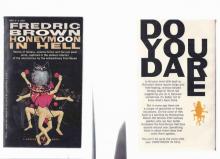 Hall of Mirrors
Hall of Mirrors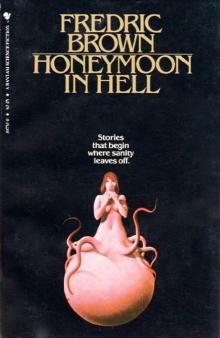 Honeymoon in Hell
Honeymoon in Hell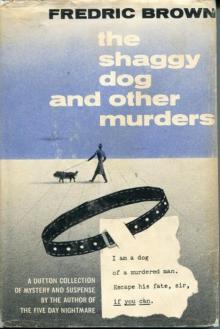 The Shaggy Dog and Other Murders
The Shaggy Dog and Other Murders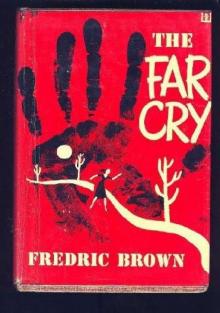 The Far Cry
The Far Cry Arena
Arena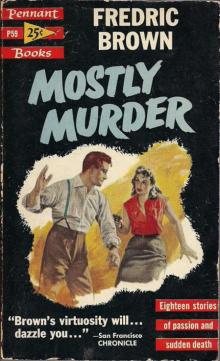 Mostly Murder
Mostly Murder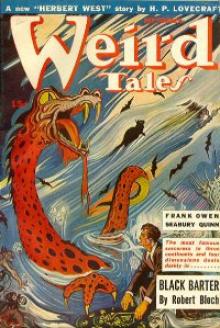 The Geezenstacks
The Geezenstacks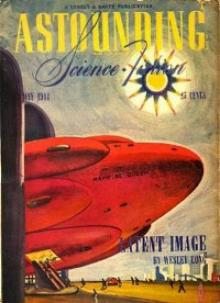 The Yehudi Principle
The Yehudi Principle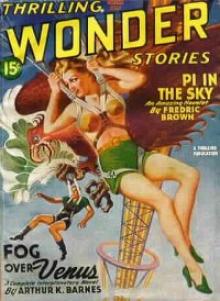 Pi in the Sky
Pi in the Sky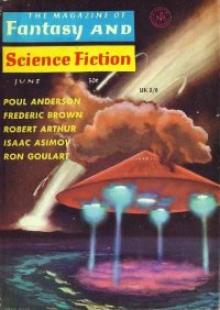 Eine Kleine Nachtmusik
Eine Kleine Nachtmusik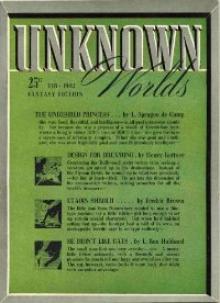 Etaoin Shrdlu
Etaoin Shrdlu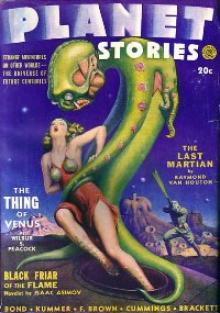 The Star Mouse
The Star Mouse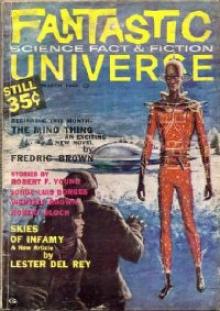 The Mind Thing
The Mind Thing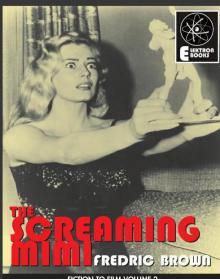 The Screaming Mimi
The Screaming Mimi The Fabulous Clipjoint
The Fabulous Clipjoint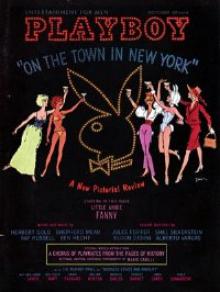 Puppet Show
Puppet Show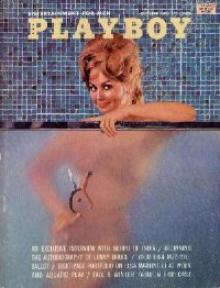 It Didn't Happen
It Didn't Happen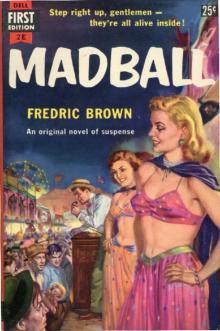 Madball
Madball Happy Ending
Happy Ending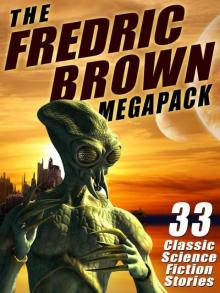 The Fredric Brown Megapack: 33 Classic Science Fiction Stories
The Fredric Brown Megapack: 33 Classic Science Fiction Stories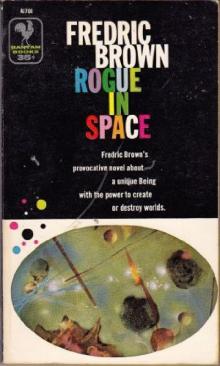 Rogue in Space
Rogue in Space Night of the Jabberwock
Night of the Jabberwock The Dead Ringer
The Dead Ringer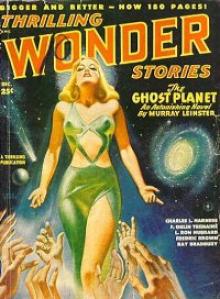 Knock
Knock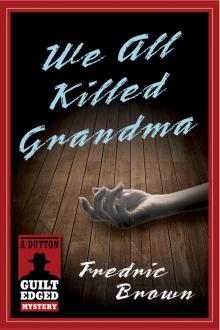 We All Killed Grandma
We All Killed Grandma Space On My Hands
Space On My Hands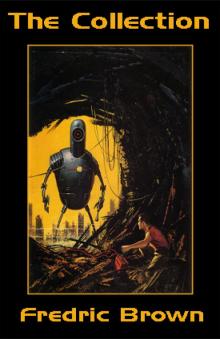 The Collection
The Collection The Second Fredric Brown Megapack: 27 Classic Science Fiction Stories
The Second Fredric Brown Megapack: 27 Classic Science Fiction Stories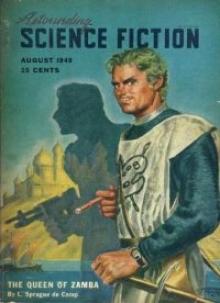 Letter to a Phoenix
Letter to a Phoenix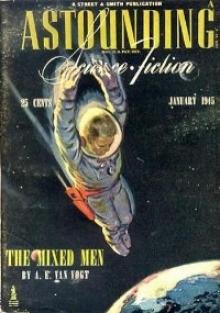 The Waveries
The Waveries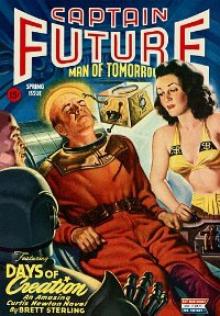 Nothing Sirius
Nothing Sirius The Deep End
The Deep End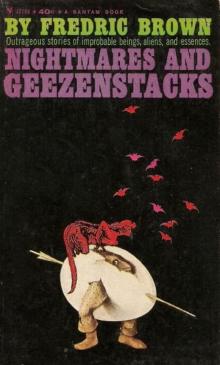 Nightmares & Geezenstacks
Nightmares & Geezenstacks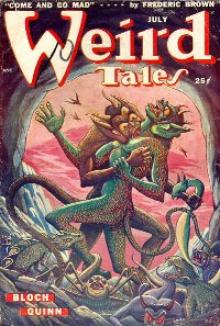 Come and Go Mad
Come and Go Mad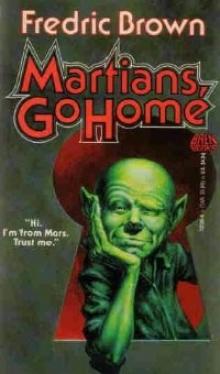 Martians, Go Home
Martians, Go Home